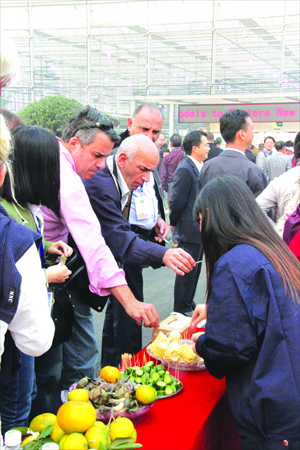HOME >> BUSINESS
Cashing in on pastoral life
By Li Ying Source:Global Times Published: 2013-10-30 19:23:01

Foreign visitors sample rural produce at the first World Agritourism Development Forum. Photo: Courtesy of WADF
Ruben Grigoryan's face was slightly blushed but he didn't feel dizzy. The chairman of RUMEA, a tourism company in Armenia, just made a toast and gulped down a bowl of home-brewed baijiu with a Chinese farmer at a local farm in central China's Hunan Province.The Chinese man was trying to promote his hard liquor to foreign visitors. "It was very good, even better than Russian vodka," said Grigoryan, who asked for a second bowl and tossed it down again. "They put ginseng in the alcohol and I like it. It is very clean as well," he told his companions.
Grigoryan was on a business trip to Wangcheng district in Changsha, capital city of Hunan, to attend the first World Agritourism Development Forum (WADF) from October 24 to 28.
The forum, sponsored by The China Association for Public Diplomacy, and organized by Hunan Qianlong Lake Investment Group and Beijing Shiji Xiandao Culture Development Center, was held at a time when China has seen a rise of leisure agriculture and rural tourism, and the local governments are making efforts to explore productive urban-rural integration models to boost the local economy.
Mayors from 26 cities around the world, diplomatic envoys from 46 embassies in China, and other delegates gathered at Wangcheng, sharing and exchanging their experiences.
Rural tourism originated in Europe in the 1850s when French aristocrats traveled back to their rural hometowns for leisure. In the 1980s, leisure tours were further integrated with pastoral experiences, such as giving city dwellers chances to ride horses, fish, work on the farm and pick fresh fruits and vegetables.
Xing Jun, executive director and secretary general of the organizing committee of the WADF, explains forms of rural tourism differ by countries and regions. "For example, the European and American style features fishing excursions and manor tours. The Chinese way, similar to Poland and Hungary, is characterized by a family tour, in which parents and children spend days at a farm, doing chores, eating and experiencing rustic cottage life."
At the mayor forum, Ng Yen Yen, chairwoman of the Malaysia Tourism Promotion Board, highlighted the importance of sanitary and clean toilets in rural tourism from Malaysia's experience.
Maurizio Martina, vice minister of the Italian Ministry of Agricultural Policy, Food and Forestry, said the urbanization of Italy in the 1960s has allowed the country new opportunities to find out ways to integrate agriculture, tourism and the handicraft industry. They have developed eco-agriculture to cater to people's demand for healthy food.
Long Yongtu, chief negotiator of China's WTO accession, pointed out in his speech that for China, a country presently undergoing fast urbanization, the development of leisure agriculture and rural tourism is connected with the aim of increasing farmers' and rural people's income.
He hopes that the forum, which is expected to be held annually, can promote local governments to help farmers deal with the real problems they encounter in their business.
In Xing's opinion, globalization has made the leisure agriculture and rural tourism market expand from local to global. The number of high-end tourists who go around the world not only for leisure but also for trade and investment is rising.
"But there is no unified international rural tourism industry standard," said Xing. "The forum, which reaches a Wangcheng Consensus, is aimed at building a city alliance and a multi-national platform that can provide consulting and ventures for global leisure, agriculture and rural tourism enterprises.
Posted in: Press Release